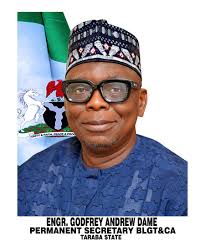In the heart of Nigeria’s Northeast, where tradition meetso modern governance, the Bureau for Local Government, Traditions, and Chieftaincy Affairs in Taraba State has undergone a remarkable transformation under the leadership of Engr. Godfrey Dame Andrew. Since assuming office as the Permanent Secretary, his tenure has been defined by a commitment to strengthening traditional institutions, promoting administrative excellence, enhancing infrastructure, and fostering unity among diverse communities. His leadership has not only revitalized the bureau but has also reinforced the indispensable role of traditional rulers and local governments in governance, conflict resolution, and community development.
One of the most significant strides under Engr. Andrew’s leadership has been the proactive approach to strengthening traditional institutions. Recognizing the void created by long-standing leadership vacancies, he facilitated the appointment of new Third Class Chiefs across the state. In March 2025, he announced the approval of two new Third Class Chiefs to fill vacant stools in Ando Idi Chiefdom of Wukari Local Government Area and Chanchanji Chiefdom of Takum Local Government Area. These appointments restored stability to several communities and reaffirmed the government’s dedication to upholding traditional leadership structures. The appointments were not just about filling positions; they were a statement of intent—an acknowledgment that traditional rulers remain custodians of peace, culture, and grassroots governance.
Furthermore, Engr. Andrew has actively engaged traditional leaders, ensuring that they are not sidelined in the state’s decision-making processes. His leadership has fostered stronger collaborations between traditional rulers and local government administrations, reinforcing their role in conflict resolution, communal harmony, and cultural preservation.
However, Beyond his influence on traditional institutions, Engr. Andrew has played a significant role in addressing key challenges within the local government system. A major example was his swift intervention when local government workers in Taraba State faced delays in their February 2025 salaries. In response to their concerns, he clarified that the delay was due to the state’s non-receipt of its statutory allocation from the Federation Account Allocation Committee (FAAC). He reassured affected workers of the government’s commitment to their welfare and ensured that salaries would be disbursed promptly upon receipt of the allocation. His transparency and proactive communication helped ease tensions, reinforcing confidence in the government’s handling of local administrative affairs.
Additionally, Engr. Andrew has been instrumental in strengthening the synergy between local government councils and traditional rulers. Recognizing that local governance cannot function effectively without input from traditional leaders, he has worked to integrate their voices into grassroots decision-making processes. This collaborative approach has improved governance, enhanced security, and facilitated intelligence gathering to address communal conflicts.
Beyond leadership appointments and financial oversight, Engr. Andrew has introduced a new culture of professionalism within the bureau. From the outset, he made it clear that inefficiency, religious bias, and administrative complacency would have no place in the system. His bold stance on accountability and discipline has inspired a more productive workforce, driving efficiency in service delivery.
He has consistently emphasized open communication, urging staff members to contribute innovative ideas that can push the bureau forward. His leadership style—one that balances discipline with inclusivity—has created an environment where employees feel valued and motivated to work toward a shared vision. This has significantly improved the bureau’s operations, making it more responsive to the needs of both traditional rulers and local government administrations.
Understanding that traditional institutions require more than just symbolic support, Engr. Andrew has also turned his attention to infrastructural improvements. His recent inspection of the Taraba State Chiefs’ Guest House in Jalingo underscores his commitment to ensuring that traditional leaders are provided with befitting accommodations. This facility, which serves as a residence for visiting traditional rulers, is a critical part of the state’s support for its custodians of culture.
By prioritizing such infrastructural enhancements, Engr. Andrew has sent a clear message: Taraba State values its traditional rulers, not just in words, but in tangible actions that improve their working and living conditions. His insistence on maintaining high standards in these facilities reflects a broader commitment to dignifying the roles of traditional leaders within the governance structure.
Engr. Andrew’s tenure has also been marked by a deliberate effort to integrate traditional leadership with contemporary governance while promoting cultural heritage. In January 2025, he publicly endorsed the Belle Hunting Festival, an annual cultural event, highlighting its significance in fostering unity and promoting tourism in the state. His support for such initiatives underscores his broader vision of preserving and celebrating Taraba’s rich cultural heritage while leveraging it as a tool for social and economic development.



